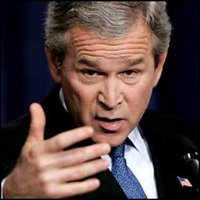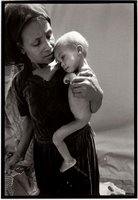Baptism by Fire: The World Bank Threat
The WB's threat to cut aid to Ethiopia bodes badly for the people of Ethiopia. An ancient Ethiopian proverb goes "when two elephants fight, the only one that dies is the grass beneath them." Fellas, it's time to head back to the bargaining table.
How will the EPRDF react to this threat? It will largely depend on whether the Bush administration will join the WB bandwagon. The bank, headed by neocon Paul Wolfowitz, has made a ballsy move and its November 16 threat should worry the heck out of the EPRDF. However, despite the Bush administration's apparent intolerance of governments that wield the gun on their citizens (even when they serve United States interests), it is highly probable US policy will remain pro-EPRDF as long as al-Zarqawi continues to murder people in Baghdad and elsewhere.
Meles has been in the forefront in the war against terror—not just to serve US interests in the region but because he himself has hunted down jihadist elements way before 9-11. Unlike Isayas, he has never had to compromise with Islamic fundamentalists during his days in the TPLF. The TPLF also decisively engaged the likes of Al-Itad after seizing power in Addis. Meles is a sure ally in President Bush’s National Security Council. But let's get one thing straight--Ethiopia has been dealing with Islamic fundamentalism for centuries; in a way, the US is a relative newcomer to this war.
The opposition, even if it assumes power, does not have a trained force, much less a militia, en garde, and able to deal with the ancient ugly head of Arab intransigence in the Horn.
But wouldn’t the CUD offer the same commitment to fight death-warmed-over al-Zarqawi and bomb-strapping wives? It could but it can’t deliver the goods. Let's assume for a moment the EPRDF does what the expat community wants it to do--immediately relocate to Mekele. The power vacuum would be disastrous. Several group s, including Oromo and Somali factions, either through their own will, or encouraged by outside forces such as Eritrea and Arab states (including Egypt), may declare their desire for independence. The US may fear that the CUD will not be in any position to withstand pressure from these forces while it attempts to consolidate its power base in Addis, without EPRDF support. Unfortunately, the possibility of anarchy in Ethiopia, with the CUD, UEDP, Oromo, Southern, and Somali factions duking it out is not outiside the realm of possibilities.
s, including Oromo and Somali factions, either through their own will, or encouraged by outside forces such as Eritrea and Arab states (including Egypt), may declare their desire for independence. The US may fear that the CUD will not be in any position to withstand pressure from these forces while it attempts to consolidate its power base in Addis, without EPRDF support. Unfortunately, the possibility of anarchy in Ethiopia, with the CUD, UEDP, Oromo, Southern, and Somali factions duking it out is not outiside the realm of possibilities.
 s, including Oromo and Somali factions, either through their own will, or encouraged by outside forces such as Eritrea and Arab states (including Egypt), may declare their desire for independence. The US may fear that the CUD will not be in any position to withstand pressure from these forces while it attempts to consolidate its power base in Addis, without EPRDF support. Unfortunately, the possibility of anarchy in Ethiopia, with the CUD, UEDP, Oromo, Southern, and Somali factions duking it out is not outiside the realm of possibilities.
s, including Oromo and Somali factions, either through their own will, or encouraged by outside forces such as Eritrea and Arab states (including Egypt), may declare their desire for independence. The US may fear that the CUD will not be in any position to withstand pressure from these forces while it attempts to consolidate its power base in Addis, without EPRDF support. Unfortunately, the possibility of anarchy in Ethiopia, with the CUD, UEDP, Oromo, Southern, and Somali factions duking it out is not outiside the realm of possibilities.The big wild card is Eritrea. Christopher Clapham's irresponsible view that Meles may ignite a war helps no one—except the Eritrean government. It will attempt to convince the international community that any act of war was started by Ethiopia. Sadly, Clapham has handed Eritrea a raison-de-guerre. Once the heavy artillery starts falling, the outcome of a war is uncertain and its impact in the border region, Addis, and Asmara is beyond anyone's imagination. It seems suicidal for Eritrea. But a war, if it will be fought, may not be similar to the 1998-2000 trench warfare generally limited to the border area. Repeated Ayders and Eritrean attempts to strike at command and control positions is a possibility, and this is very disconcerting to thousands, if not millions, of innocent non-combatants in Ethiopia.
As far as the political crisis--the US could step-up its pressure in Addis—hopefully by a real Senate-confirmed Ambassador, to reorganize the Troika; perhaps include World Bank and IMF executives; Annan himself (dude, use your good offices for a change and stop your Monday morning quarterbacking), and help restart the dialogue between the EPRDF and the CUD. This time, the stakes are too high and both parties should agree to conditions laid out by the organizers of the dialogue. I’m not sure what these preconditions would be. Maybe, and just maybe, get the EPRDF to agree to (1) change the undemocratic and really lame lame-duck session parliamentary rule and (2) accept a security council investigation on the deaths of rioters (a la Syria). The CUD then commits to join the parliament (where it would pursue the other 8-point items in its talking points through legislative means).
Two scenarios the EPRDF and the CUD wish upon each other: (1) CUD moderates off Hailu Shawel and the other engineer in jail; form a cabal, and decide to join parliament; (2) Jeffrey Sachs visits Meles in Addis and tells him what's obvious--that the country is tethering toward disaster and tells him that the game is up (a la Barry Goldwater's White House visit in 1974) and that he holds, in his double-breasted breast pocket, an offer letter from Beijing University promising Meles a tenure-track professorship and department chair position in the Land Tenure Department.
None of these scenarios are likely to play out in Addis and China. Besides, if there's to be any offing within the CUD, Shawel will be the off-er and not the off ee. Engineers make lethal shanks. Sachs’ dying words, like John Adams’, will be something like “Meles still survives.” A stretch but you get the point.
ee. Engineers make lethal shanks. Sachs’ dying words, like John Adams’, will be something like “Meles still survives.” A stretch but you get the point.
 ee. Engineers make lethal shanks. Sachs’ dying words, like John Adams’, will be something like “Meles still survives.” A stretch but you get the point.
ee. Engineers make lethal shanks. Sachs’ dying words, like John Adams’, will be something like “Meles still survives.” A stretch but you get the point.I think Meles wants to sit at the bargaining table--he just needs a face-saver. He wants a bone (kene QilTimu) but no one has been willing to throw him one. But he's not throwing any either.
The entrenched views are frighteningly dead-ended and the World Bank threat, unless backed by substantive efforts to move the political process forward will do nothing but harm the children of Ethiopia whose monthly calorie intake would be quenched with a couple of "Vyagras" at Madjet.
Permission to use photograph of mother and child is granted by David Blumenfeld
©David Blumenfeld/www.blumenfeld.com

